Low Carb USA Conference
Over the weekend, I had the pleasure of attending the Low Carb USA conference in San Diego. I spent 3 days catching up on some of the new science regarding keto health benefits, benefits that go well beyond weight loss. People often think of low carb or keto as a way to manage weight loss. While this appears to be true for many, weight loss is only one of many health benefits derived through a low carb/ketogenic lifestyle. In today’s post I’d like to highlight some of the information that I learned at the conference.
Nicole Avena – Food Addiction
Health Benefit: Low-Carb/Keto reduces the overall level of sugars in the diet and induces natural appetite suppression which helps manage sugar addiction and over eating due to hedonistic hunger.
Dr. Nicole Avena is both a phychologist and neuroscientist and expert in the field of nutrition, diet and addiction. I have to admit, I had not heard of Dr. Avena prior to sitting in on her lecture at the conference. This also happened to be one of my favorite lectures. I found the information fascinating. Dr. Avena’s books, Why Diets Fail and Hedonistic Eating: How the Pleasure of Food Affects our Brains and Behavior are now on my reading list.
What is a food?
She asked what is a food? When looking at a nutrition label, a real, whole food is easy to identify, the actual food is what’s listed in the ingredient list. For example, a bag of baby carrots will say ‘baby carrots’, almonds will say ‘almonds’ and so on. The more ingredients listed in an ingredient list the more processed the food. She used pop tarts as an example. You can not identify pop tarts as pop tarts just by reading the very extensive ingredient list.
The amount of processing can be what makes a good food into a harmful food. She gave several examples saying the whole, natural form of a lot of foods don’t have the negative effects (due to over consumption) that those foods can have once highly processed. Here are a few of the examples she gave:
- Coca Leaf vs. Cocaine
- Grapes vs. Wine
- Corn vs. Cheetos
- Sugar Cane vs. White Table Sugar
Hunger
My favorite part of her talk was about types of hunger. I put a bit about this up on facebook. She described hunger vs. hedonistic hunger.
True hunger causes the body to feel uncomfortable and weak. This is something we want to stop from happening. Eating takes this away. It’s a negative feedback system. Eat and something bad stops happening. When the uncomfortable feelings and weakness go away you stop eating.
Hedonistic hunger is a positive feedback system. You’re not eating because you’re hungry and trying to stop uncomfortable pangs in your stomach, you’re eating to achieve a pleasurable feeling. This is a positive feedback system. You do something and derive pleasure so you want to continue to do that thing – eating ice cream for example.
How often, in this modern world do any of us experience real hunger? Most of the time I think we all think about what yummy thing we’re going to have for a snack or lunch or dinner. This goes for low carbers and even the keto crowd. All that focus on fat bombs and treats is hedonistic hunger wrapped up in a rational of “it’s what my body needs”. Have I mentioned that you CAN over eat even when following a low carb or keto lifestyle??
Sweet Tastes
Her research indicates that sweet tastes are what cause the reward and reinforcing effects of certain foods. This is why some people can have issues with sugar substitutes. The sweetness from the sugar substitute is enough to cause cravings associated with hedonistic hunger. This isn’t the case for everyone. I think this might be an issue for me. I know stevia is one of the sweeteners that usually has me hunting around for more goodies.
If there is addiction to specific foods, your personal triggers, you must eliminate those foods 100%.
Ivor Cummings: An Engineering Guide to Chronic Disease Avoidance
Health Benefit: Low-carb/Keto lifestyle improves insulin sensitivity, reduces systemic inflammation and chronic, degenerative disease
Coronary Calcium Score
Ivor is all about CAC (Coronary Calcium Score) as the Master Measure for risk factors associated with all cause Mortality. CAC is a heart scan you can have done at an imaging center. Out of pocket this test is usually $100 – $150 dollars. Ideally you’d like to see a score of zero. That would mean there is zero calcium build up in the arteries. If you have a score above zero, it’s best to retest each year and make sure that number is holding. You don’t want to see that number increase.
Here is a slide showing CAC score and the associated risk of all cause mortality
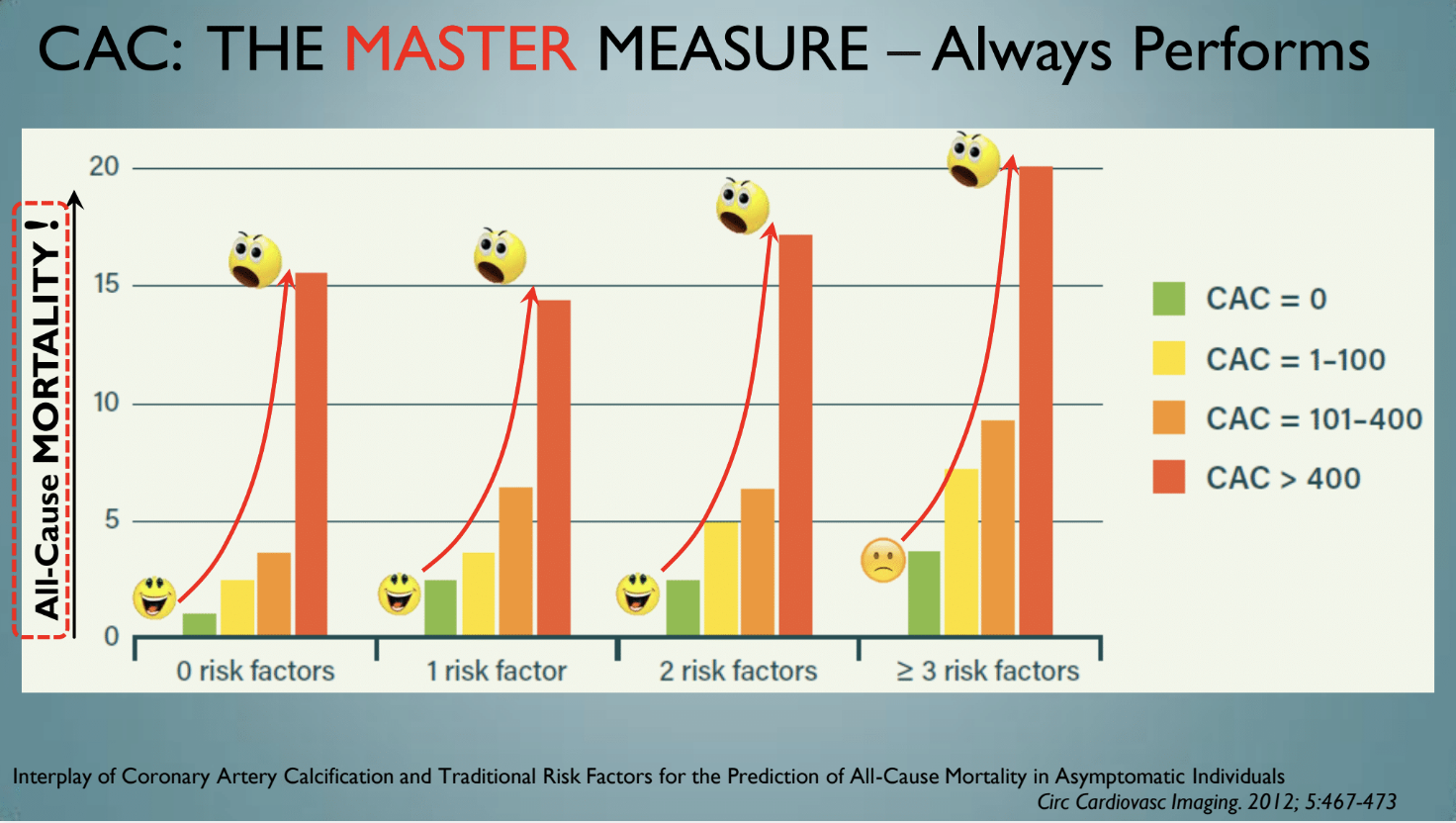
As you can see from the slide, as your CAC score increases so does all-cause mortality. You’ll also notice that other health risk factors play a huge part in an increased score of all cause mortality. What are those other risk factors?
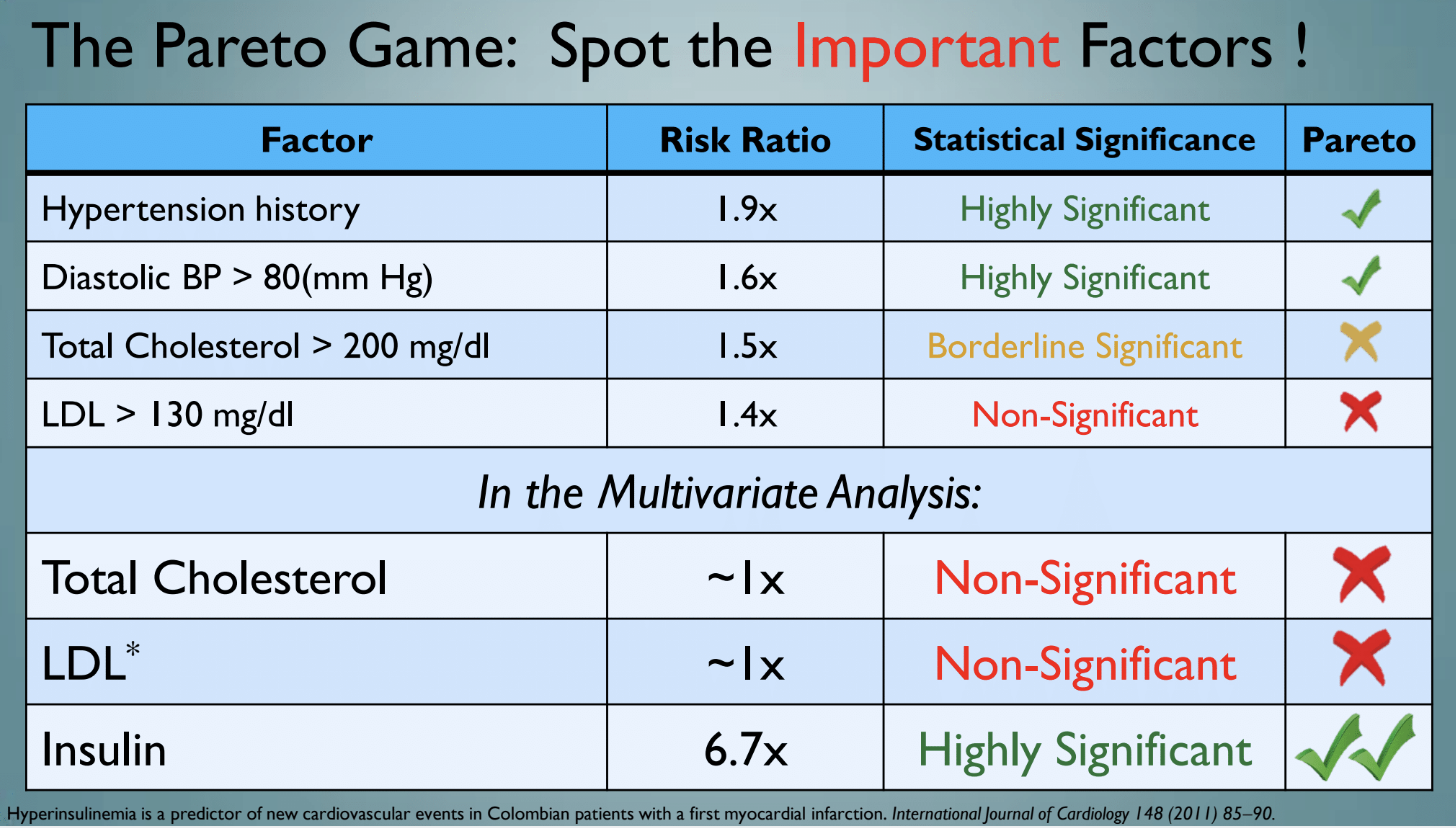
Hyperinsulinemia & Health Risks
Hyperinsulinemia has the highest risk ratio. The array of chronic diseases associated with hyperinsulinemia:
- Cardiovascular Disease / Atherosclerosis
- Diabetes / PCOS (Polycystic Ovarian Syndrome)
- Central Obesity / Sleep Apnea / Metabolic Syndrome
- Hypertension
- Non-Alcoholic Fatty Liver Disease / Renal Failure
- Dysplipidaemia / Metabolic Syndrome
- Certain Cancers
Even if you don’t get a CAC score, if you are dealing with any of the above conditions you are putting your health at risk. The good news, there are solutions that reduce your risk of heart disease and all disease:
- Adopt a low carb or ketogenic lifestyle which will cut out excess fructose and glucose, reducing insulin resistance, inflammation and hyperinsulinemia
- Increase the ratio of omega 3 to omega 6 fats. Eat more wild caught, fatty fish, eliminate processed seed oils like canola and soybean oil. This will reduce inflammation and cellular damage
- Increase your level of magnesium with food and supplements
- Increase vitamin D levels. Ideally get out in the sun but don’t let your skin burn. Supplement with vitamin D3 when necessary
- Learn to Intermittent Fast and Life Heavy Things (strength training) – both have a positive impact on increased insulin sensitivity
- Always work on getting better sleep, reducing stress and making sure you are moving your body
What to do if you do get your CAC score:
- LOW CAC Score – Follow all steps noted above. Retest CAC in 5-7 years.
- HIGH CAC Score – Track blood labs: Fasting Insulin, Fasting Glucose, Hemoglobin A1c, Trig/HDL ratio, GGT, Ferritin, Blood Pressure, HS-CRP, Homocysteine, ApoB/ApoA 1. Follow all steps above. Retest CAC 1-2 years to make sure level is stable.
Dr. Jeff Gerber: Weight Loss Stalls and Aging Gracefully
Health Benefit: Low-carb / Keto lifestyle uses fat as the primary body fuel, reducing cellular oxidative damage helping the body to age gracefully
Calories Matter
I loved Dr. Gerber talk about weight loss and weight gain. He explained that on a low carb or ketogenic diet most people notice their greatest weight loss in the first 6 – 12 months. After 12 months people often stall or even start to gain weight. The key is how to maintain long-term weight loss.
Basically, calories matter. Even if you improve your insulin sensitivity, you can still gain weight. The idea of metabolic hormone balance needs to be combined with an understanding of overall calorie consumption. I TOTALLY agree with this!! One of the great things about a ketogenic lifestyle is natural appetite suppression. This results in spontaneously eating less which equals less calories. I’m going to elaborate on this idea on my Facebook Live on Wednesday. If you don’t follow my facebook page please go and like the page so you are alerted when I’ve added new information. You can find my facebook page here.
Healing metabolic hormone imbalance is key. This is the first step to being able to recognize and feel true hunger. Remember that bit earlier about hunger vs. hedonistic hunger? We need to be able to feel hungry and then know when we feel full. Healing insulin sensitivity as well as leptin sensitivity is how we can get back to regulating our body weight naturally through signals of hunger and satiety.
Too Much Fat
So what gives when it comes to weight loss stalls and regaining weight? FAT. Yup, I am totally, 100% in agreement with this idea. I think people jump on the fat bandwagon, do great at first because their body needs the dietary fat “prompt” to start up regulating fat burning but once fat burning becomes efficient the dietary fat has to be reduced. This doesn’t mean LOW-FAT it just means, if you want to use your ‘personal pantry of body fat’ you have to stop giving the body easy to access dietary fat. Why would your body dig deep if it doesn’t have to??
Here’s Dr. Gerber’s slide on Dietary plus BODY FAT as fuel.
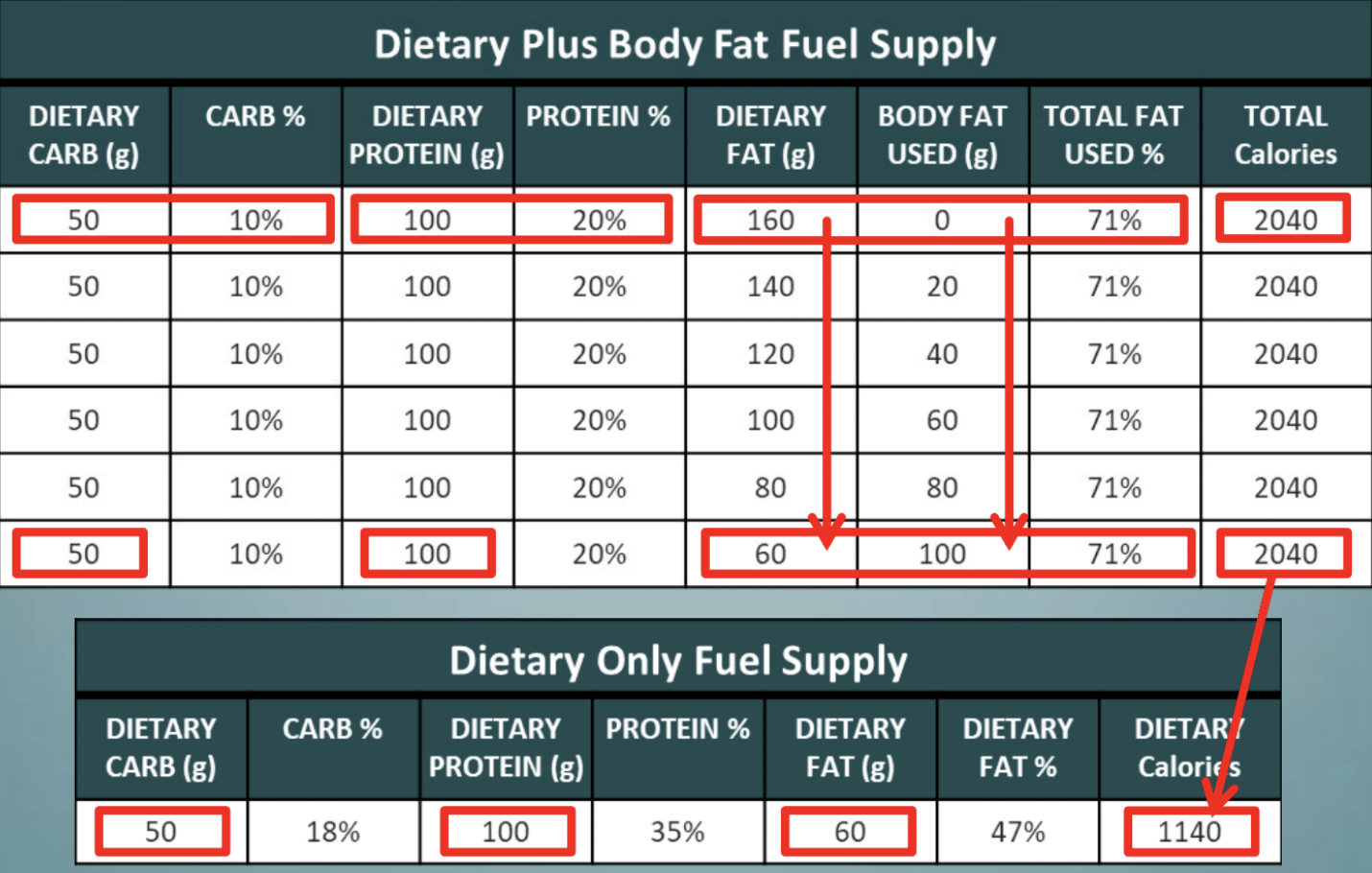
This might seem a little confusing. The columns to take note of are, Dietary Fat, Body Fat Used and Total Calories. As you reduce the grams of dietary fat, you use more body fat. You aren’t eating low-fat, your % of fat used stays the same. Calories stay the same. BUT, we want to reduce calories to continue to lose weight or perhaps to maintain weight loss. This is when you increase the % protein and reduce the % of fat. This is also known as a Protein Sparing Modified Fast. This is where I like to be, protein around 35% of my food. Guess what, protein makes you feel full. The protein fills you up and the fat keeps you feeling full. You increase that protein and you spontaneously tend to eat less calories overall.
Personally, I don’t like calories that low (1140) on a regular basis. That’s a starvation level to me. I don’t mind that a few days a week but I like that mixed with higher calorie days, 1300, 1500, 1700 and sometimes even over 2000 calories/day. I don’t generally track my calories. I mean, I do but only to see what the total ends up being on any given day. I don’t track them to hit a specific number, mostly it’s to make sure I’m getting enough calories. As it turns out, I naturally fluctuate calories just by following my hunger. Some days I eat less and some days I eat more.
Dr. Gerber, quoted Dr. Ben Bikman: “Control Carbs, Prioritize Protein and Fill with Fat”
I like this quote, it makes things simple but I really believe you ‘fill’ with protein and cruise (stay satiated) on the fat.
Health Goals
Dr. Gerber went on a bit of a tangent into overall health goals and longevity. He got me thinking about the ultimate human goal. What is that really? Is it getting healthy, losing weight and maintaining that weight? Yes, those are good goals but really, more short-term goals. The real goal, the long-term goal, aging gracefully. I think it’s safe to say, we all want to be physically healthy and mentally vibrant for as long as we live. I think that could be termed aging gracefully.
I love this quote from Dr. Gerber: “Longevity is an endurance sport”
In order to succeed at this most important endurance sport and achieve the goal of aging gracefully we need to reduce ongoing, long-term damage to our bodies by reducing oxidative stress.
Dr. Gerber says to think of the body like a battery. There are two ways to charge the battery, fast or slow. Glucose (ex. bread/carbs) would be our rapid charge. Think of this fuel as high voltage, high currency with lots of ‘heat’ generated. This ‘heat’ is the equivalent of increased oxidative stress and damage. Fat would be our slow charge, low voltage, low currency less heat, less damage.
Basically, embrace a low-carb or ketogenic lifestyle. Ditch the high octane, inflammatory sugar fuel for the slow burning, sustainable, less damaging fat fuel.
Dr. Gerber’s Steps to a Healthier Life
- Limit sugar, grains, seed oils and processed foods (reduce inflammation and oxidative damage)
- Eat Real Food, Control Carbs, Prioritize Protein and Fill with Fat
- Eat Less through natural appetite suppression/control
- Supplement
- Reduce Stress, Sleep Well and Get out in the Sun
- Move your body, stay active
Dave Feldman. The Cholesterol Guy
Health Benefit: Living a low-carb / keto lifestyle reduces the thickness of the carotid artery, a marker of risk associated with heart disease and stroke. Bigger point, it’s a lifestyle for health and longevity. Returning to a standard American diet brings all the unwanted health issues back.
Testing for Health Risks
You may know Dave Feldman from his work with lipids (cholesterol), that’s how I know him. I LOVE his work. If you aren’t familiar you should look him up, you can find his blog here. I’ll spend a lot more time talking about Dave and his work in the future when I dig into fats and why they are so important for health. Most of Dave’s talk was stuff I already knew (from him) about cholesterol and fat. The new piece or test that he threw in was about using the thickness of the carotid artery as a health marker.
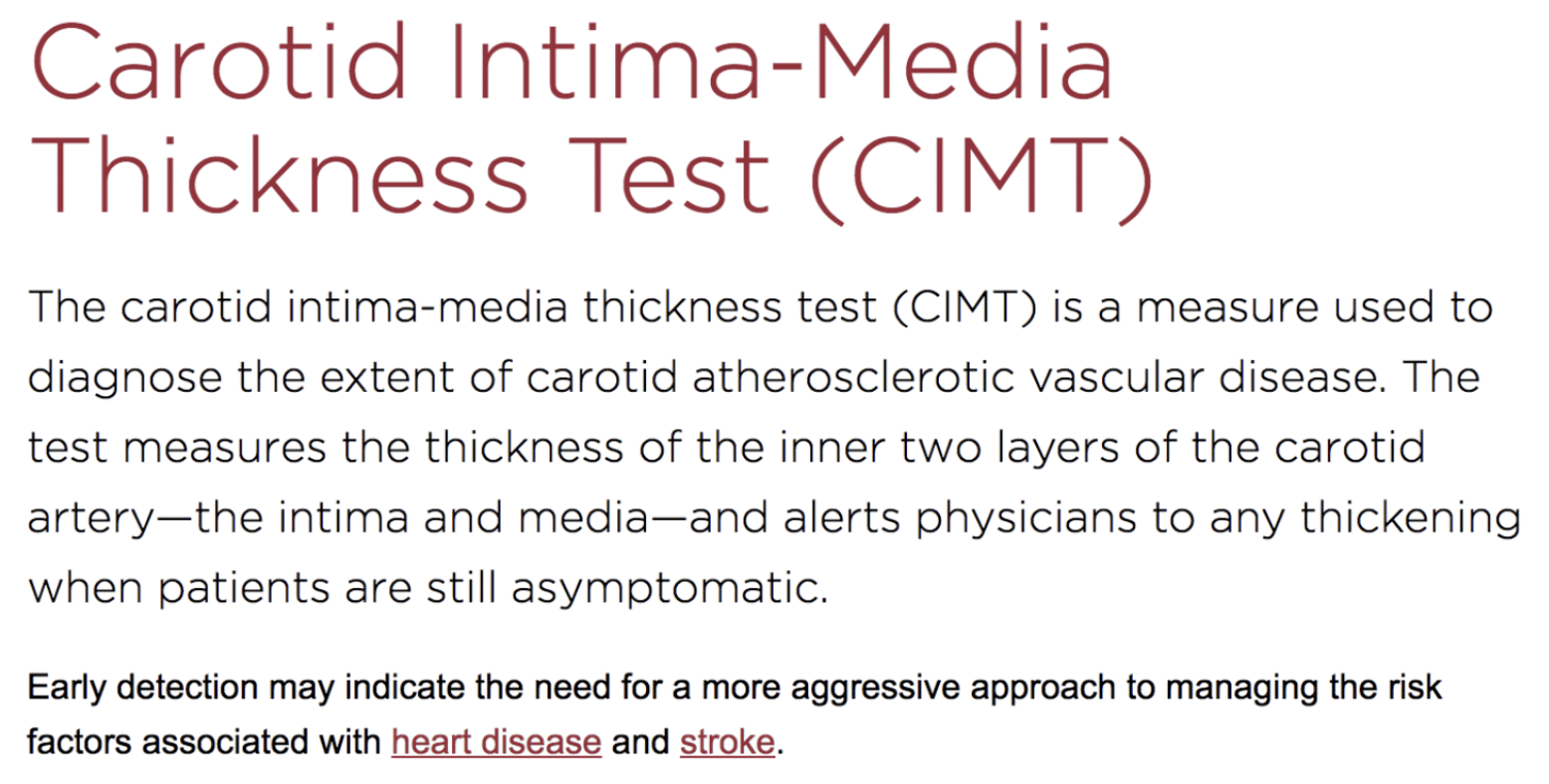
Dave notes factors believed to be related to a thickening of the carotid artery:
“Aging is a contributing factor to increased carotid intima-media thickness. Other risk factors include high lipoprotein levels, high blood pressure, smoking, diabetes, obesity and a sedentary lifestyle.”
Here is the slide of Dave’s progress over 16 months on a ketogenic diet. As you can see, the thickness of both his right and left artery reduced! By the end both arteries were about the same size/thickness. 4 weeks, just 1 month back on a standard American diet and the thickness of his arteries JUMPED beyond his starting thickness.
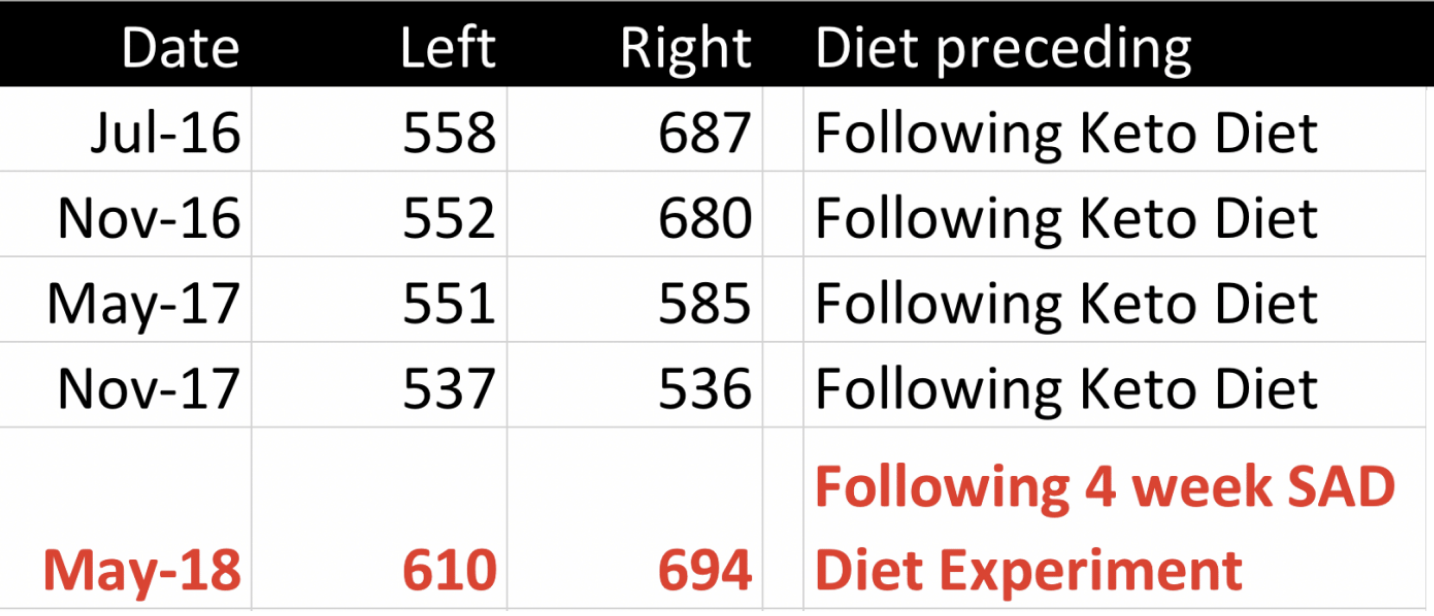
Focus on HDL/Trigs
I was going to end there with Dave’s stuff but I really can’t just stop without mentioning cholesterol since that is Dave’s thing and because we are talking overall health benefits of a low-carb or ketogenic lifestyle. So, you know what else happens when you follow a low-carb or ketogenic diet? Your HDL increases and your triglycerides decrease. This is what matters if you are concerned about your heart health or over all health. It’s not LDL vs. HDL it’s all about having high HDL and low Trigs.
In this next slide from Dave, you are seeing the % of Ischaemic Heart Diseae (IHD – characterized by reduced blood flow to the heart) based on the level high HDL and low Trigs, dark gray to low HDL and high Trigs, white box. The thing to note, it doesn’t matter what the LDL is, circled in purple at the bottom. HDL to Triglycerides is what appears to be the difference between low risk or high risk for IDH.
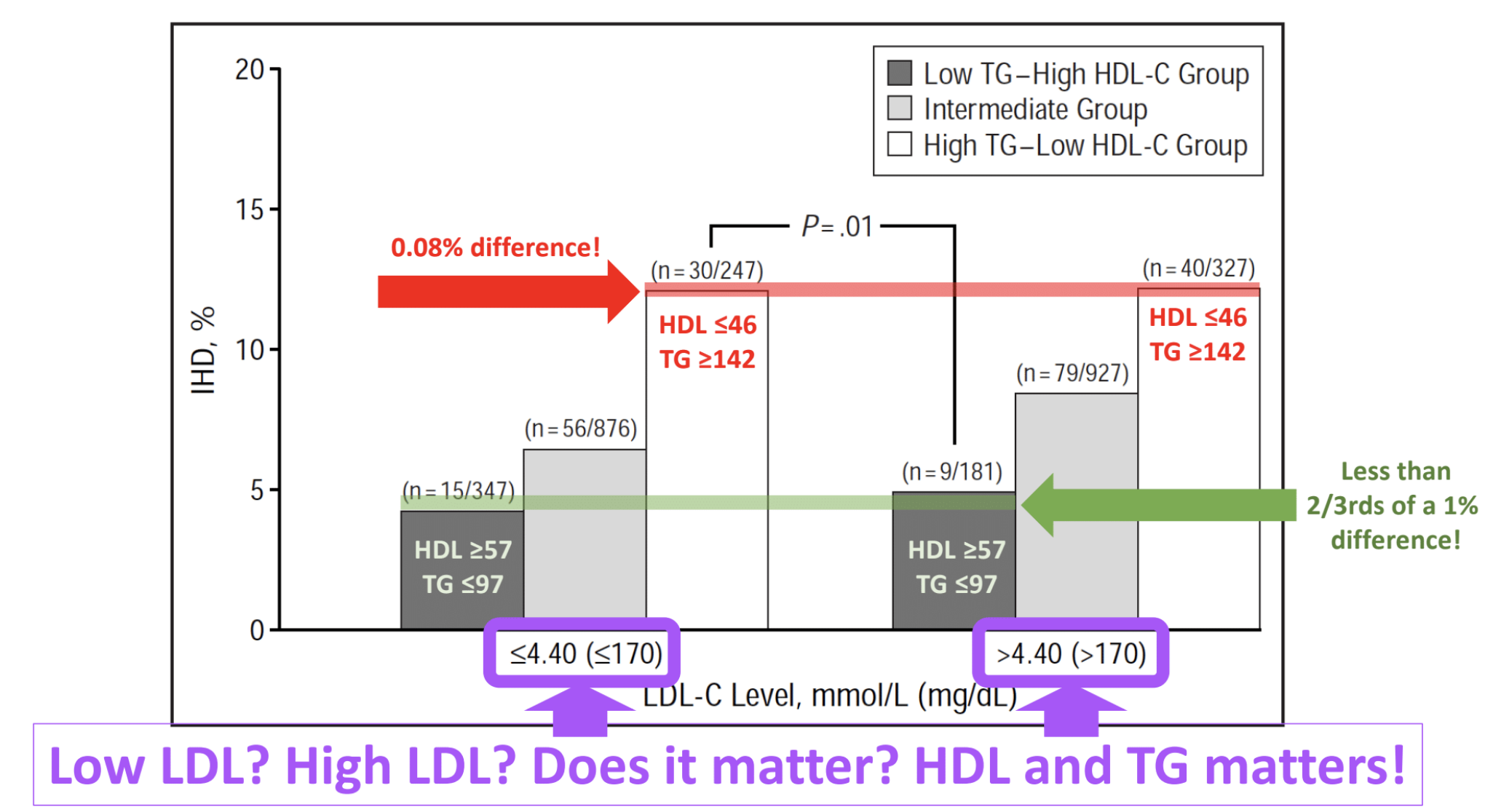
Ryan Lowery & Jacob Wilson from ASPI
Health Benefit: Many but healthy aging is a very noticeable (visible) side effect of a low-carb/ketogenic lifestyle.
Aging Well
ASPI is the Applied Science and Performance Institute. You can learn more about ASPI here. This presentation was great and had tons of very interesting information about healthy aging and the ketogenic diet. I’ll show one slide. They had us take a little quiz, which monkey is older, the one on the left or the one on the right? As it turns out, they are exactly the same age! The only difference, the monkey on the right was calorie restricted through intermittent fasting which caused glucose to go down and ketone bodies to go up.
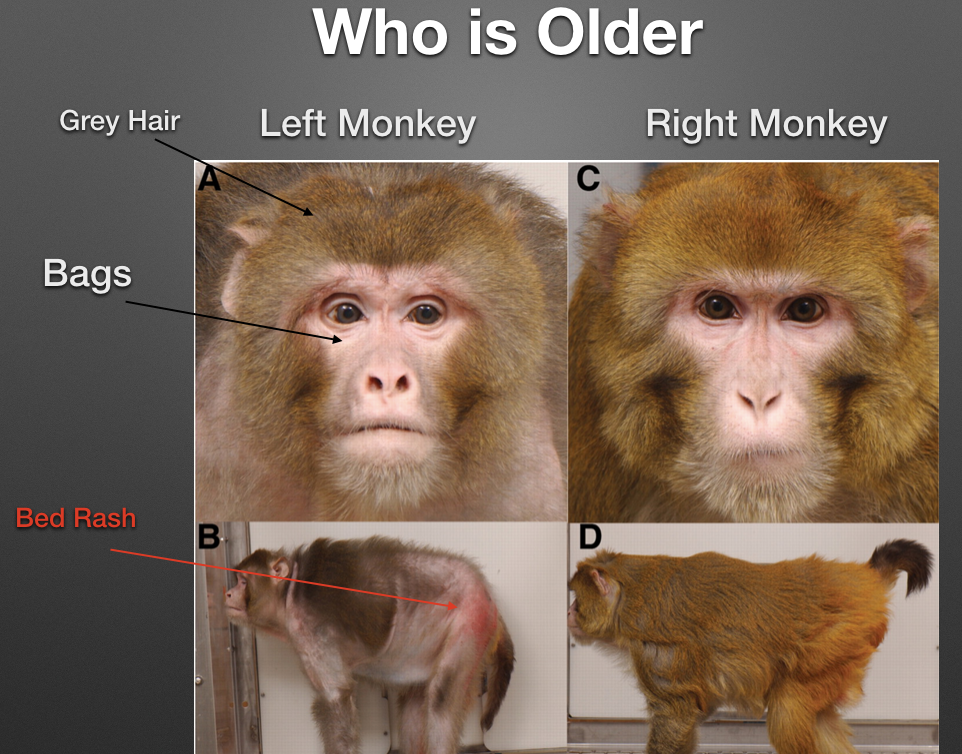
Healthy Aging Brain
One other thing that they mentioned was the brain and how, as we get older our brains can’t use glucose as well/efficiently as they did when we were younger. That makes me feel even more strongly about transitioning my body sooner rather than later to utilizing ketones as brain fuel!
There was so much more in this talk about benefits for Crohn’s disease and Parkinson’s but I’ll leave it here for now.
Jeff Volek, PhD, RD: Keto-Adaptation: Implications for Human Performance
Health Benefit: Ketogenic adaptation enhances exercise performance and recovery.
If you haven’t heard of Jeff Volek, he’s a research scientist at Ohio State University and one of the big names in ketogenic research. He’s written several books with Dr. Stephen Phinney, The New Atkins for A New You, The Art and Science of Low Carbohydrate Living, The Art and Science of Low Carbohydrate Performance and more.
Ketones & Athletes
I’m going to wrap this up and just give you Jeff Volek’s 10 reasons that enhanced use of Free Fatty Acids & Ketones for fuel benefit athletes.
- Lots of available fuel to dig into. “Fat is stored in greater quantities” than sugar.
- Fat is a more efficient source of fuel than carbs. BHB (beta hydroxybuterate, blood ketone) increases the efficiency of ATP production in cells and reduces the production of damaging free radicals.
- Decreased need to fuel during exercise. Don’t need to eat constantly during long (endurance) bouts of exercise because most of the energy for fuel from from stored body fat
- Ketones decrease oxidative stress. Less damage to the body.
- BHB (ketone) decreases inflammation. This is true for athletes as well as those suffering with metabolic syndrome and type 2 diabetes.
- Enhanced recovery from exercise. Here’s a quote Jeff Volek shared – “I made the switch to a high-fat, low-carb diet near the end of July. It has changed my life. Just like you said, the first few weeks were extremely difficult, but now I am reaping the benefits. Not only has my body composition improved by performance has significantly increased. I won a trail 100k a few weeks ago, and broke the course record by over an hour. The time it takes me to recover is unbelievable (went for a run the day after the 100k and felt fine.) Besides the performance benefits, overall I feel so much better.” – Former high-carb endurance athlete
- Keto-adapted brain is ‘bonk’-proof. Brain readily uses ketones converted from fatty acids (fat) as fuel. No energy shortage.
- Greater east of weight/fat loss. Meta-analysis of dietary interventions for overweight and obese adults consistently show benefits of ketogenic on weight loss.
- Augments health response to exercise. Single bout of exercise increases insulin sensitivity for up to a couple of days. The consumption of carb-containing foods post-exercise decreases insulin sensitivity.
- Enhanced career longevity. Study in Cell Metabolism “A ketogenic Diet Extends Longevity and Healthspan in Adult Mice.”
Jeff Volek’s summary quote:
“Keto-adaptation is a highly conserved latent human ability, kept dormant by carbohydrate-rich diets, with profound performance & therapeutic applications.”
Final Thoughts
Yes, a low-carb/ketogenic lifestyle will help you cut inflammatory sugars out of your life. This will help you kick a sugar addiction and start allowing your body to burn fat for fuel. It’s easier to lose weight when you aren’t hungry. Allowing ketones to circulate as a fuel source helps you feel less hungry.
I hope you can see that adopting a low-carb/ketogenic lifestyle goes well beyond just weight loss. The evidence of benefits for health and longevity are mounting and appear to be more protective the longer, insulin is low and ketones are present. I for one am hoping this is true and will continue to do my best to make sure ketones are one of the fuels my body regularly uses.
Are you ready to start cutting the sugars and burning the fat? Download my free guide, How to Low Carb for Life and start making changes today. Small steps eventually lead to big change!
Be well,


I’m Amy a board certified holistic nutritionist, certified functional nutritionist and lifestyle practitioner and certified Life Coach. I help women in midlife understand the changing needs of their body so that they can stop dieting and lose weight permanently. At 56 I live what I teach. Don’t believe the story that your best years are behind you. They are not. Your best years are just starting!
